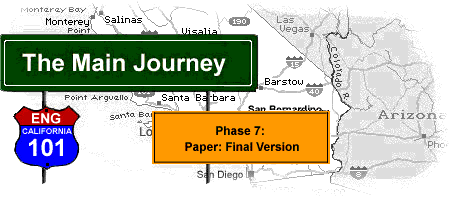 |
 |
| What is the final version of a paper? |
It's hard to tell when you have written the "final" version of a research paper. Jokingly, many writers say the final version is simply the last version completed the night before the paper is due. More importantly, a final version will reflect the fullest development of your ideas, inspired by information gathered from the most exhaustive research that you were able to conduct (given the resources available to you). A final version will exhibit the most convincing arguments you are capable of writing, supported by sound evidence smoothly incorporated into your paragraphs as support for your main points and subpoints. It will also show attention to detail in every aspect of your language--sentence structure, grammar, mechanics, diction, and style--and in the completeness and accuracy of your borrowed source information. It is this last concern that you need to focus on now, since you have already focused on the large-scale changes needed to put your ideas in order and make sure they are convincingly developed. Now it's time for the small-scale changes involved with editing. By making small-scale editing changes, you will be demonstrating to your readers that your ideas are worth reading. You will be working toward the goal of "nearly minimal distractions" for your reader, for it is well known that once a reader "breaks" from your train of thought due to a verb tense error, a missing comma, or even a misspelled word, you may never win your reader back again. And even if you do, you may have lost the reader's trust in what you have to say. That's because in taking time to carefully edit your paper, you will be showing not only your concern for the readibility of your ideas, but your pride and confidence in what you have to say. Begin your editing process by first hearing the editing concerns of Kenn and your writing partner. |
| Example of a final version | Go to "Example Paper: Final Version" to see how one main point of a paper was developed from a subsequent version into a final version. This example will be available soon. |
| Any questions or comments for Kenn? | |
| Where do I go next?
Go to "Writing Partner Feedback: Second Version" for tips on how to give and receive feedback on final versions of papers. | |
| Web Architect: Michael L. Geiger
Content by Kenn Pierson 4.9.98 - Last Updated: ©2000 M.L.Geiger - All Rights Reserved URL: www.kjpierson.com/TEACHING/ENG101 |